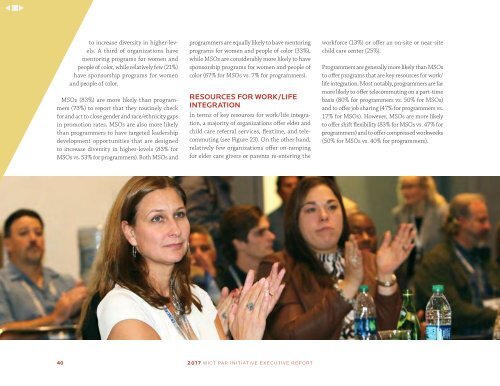Compendium Test
This is a test for the Compendium
This is a test for the Compendium
- No tags were found...
Create successful ePaper yourself
Turn your PDF publications into a flip-book with our unique Google optimized e-Paper software.
to increase diversity in higher-levels.<br />
A third of organizations have<br />
mentoring programs for women and<br />
people of color, while relatively few (21%)<br />
have sponsorship programs for women<br />
and people of color.<br />
MSOs (83%) are more likely than programmers<br />
(73%) to report that they routinely check<br />
for and act to close gender and race/ethnicity gaps<br />
in promotion rates. MSOs are also more likely<br />
than programmers to have targeted leadership<br />
development opportunities that are designed<br />
to increase diversity in higher-levels (83% for<br />
MSOs vs. 53% for programmers). Both MSOs and<br />
programmers are equally likely to have mentoring<br />
programs for women and people of color (33%),<br />
while MSOs are considerably more likely to have<br />
sponsorship programs for women and people of<br />
color (67% for MSOs vs. 7% for programmers).<br />
RESOURCES FOR WORK/LIFE<br />
INTEGRATION<br />
In terms of key resources for work/life integration,<br />
a majority of organizations offer elder and<br />
child care referral services, flextime, and telecommuting<br />
(see Figure 23). On the other hand,<br />
relatively few organizations offer on-ramping<br />
for elder care givers or parents re-entering the<br />
workforce (13%) or offer an on-site or near-site<br />
child care center (25%).<br />
Programmers are generally more likely than MSOs<br />
to offer programs that are key resources for work/<br />
life integration. Most notably, programmers are far<br />
more likely to offer telecommuting on a part-time<br />
basis (80% for programmers vs. 50% for MSOs)<br />
and to offer job sharing (47% for programmers vs.<br />
17% for MSOs). However, MSOs are more likely<br />
to offer shift flexibility (83% for MSOs vs. 47% for<br />
programmers) and to offer compressed workweeks<br />
(50% for MSOs vs. 40% for programmers).<br />
40 2017 WICT PAR INITIATIVE EXECUTIVE REPORT


